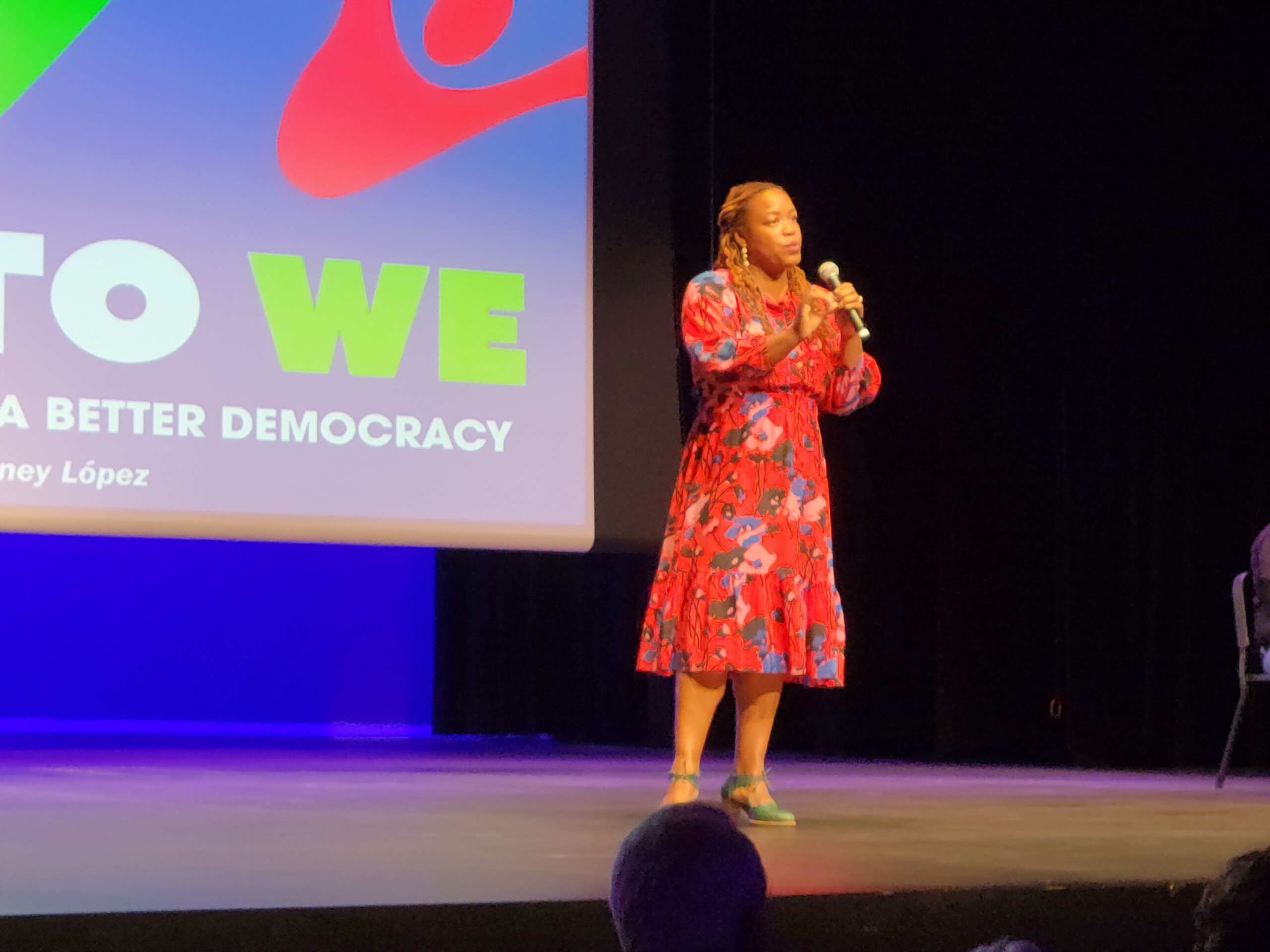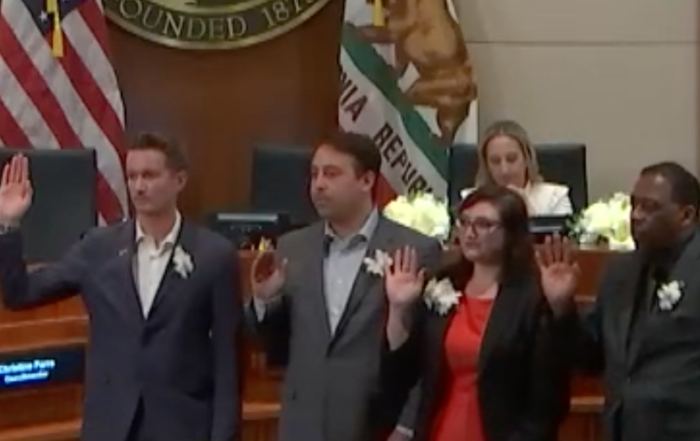Bestselling author and renowned policy advocate Heather McGhee visited Santa Monica last Thursday and delivered a mesmerizing address to a few hundred at the performing arts center at John Adams Middle School.
She was a featured portion of Santa Monica College’s Spring Symposium, an annual event sponsored by SMC’s Public Policy Institute. The address highlighted a three-year journey around the U.S. culminating in her 2021 book, “The Sum of Us: What Racism Costs Everyone and How We Can Prosper Together.”
Among those introducing McGhee was State Senator Ben Allen, who attended law school with her at UC Berkeley. But it wasn’t all work and no play. Allen humorously noted that his and McGhee’s group of friends in law school even made a campy home movie called, “Night of the Legal Dead.”
When McGhee took to the front of the stage, her presence could be immediately felt. She began with a question, “Why does it seem like we can’t have nice things?” earning some chuckles. She then clarified that didn’t mean flying cars or jet packs, but public goods like affordable, universally guaranteed healthcare, universal child care, paid family leave, and well-funded public education.
She spoke of her nearly two decades working on figuring out the “whats” of inequality but says she and her colleagues at Demos – a think tank that “champions solutions that will create a democracy and economy rooted in racial equity” – and in her other work, hadn’t figured out the “hows” of inequality.
“How it was that our society went from having an economy shaped like a football – with a fat middle class in the middle and narrow ends of low and high income … to being shaped more like a bow tie – with a squeezed middle class, and bulging ends of low and high-income households?”
McGhee, in her many years at Demos, said there were some victories, but things were getting harder and harder, and that “so often, we were backsliding.” And so in 2017, she made the decision to hand over the leadership of Demos to others and set out on this quest to answer “Not how we had become a society with so much inequality, but why?” she asked. “Why would we have done that? Why would the country that had figured out the formula to the American Dream turn its back on that formula?”
McGhee says she found three major tenets of what has been holding back our economic progress.
- The Lie of the Zero Sum Game
In a zero-sum game, there is only one absolute winner, and the rest of the participants must lose. McGhee explains that the worldview that we are somehow trapped in a zero-sum game that we can’t control is a view predominantly taught and held in the U.S. and that that view is racialized in two ways:
- Those who see the world as a zero-sum game see racial and ethnic groups as competing for status and dominance
- Those who view the world as a zero-sum game have been proven through research to be predominantly white
She explained that this view is not natural. “It’s not like there’s some relationship between the melanin content in your skin and your likelihood to see the world through a zero-sum lens,” said McGhee. “Everything we believe comes from a story we’ve been told.”
She also explained economists don’t see the world as a zero-sum game, but as one where we want all of the players on the field contributing to the success of the economy. According to McGhee, even Citigroup calculated that the Black/white divide has cost our economy $16 Trillion in just the last 20 years. “If all of your best players aren’t on the field, you’re not going to score as many points for your team. Inequality costs us growth.”
- Drain the Pool Politics
McGhee noted that there were once more than 2,000 large and lavishly funded public swimming pools in this country, some were so huge they could even accommodate 1,000 swimmers at a time. So what happened?
On a research trip to Montgomery, Alabama, she and her husband took their young son to Oak Park, a very large, well-groomed public park to play. She was curious why the park seemed to have more groundskeepers than people, and – given that it was Montgomery, Alabama and that there “isn’t an inch” of ground, she said, that isn’t dripping with contentious history – McGhee looked into it. She learned that 10 feet below ground was once a massive public swimming pool. But through assumption, intimidation, and outright confrontation, the white population maintained it was for them.
Once segregation orders started coming down at Oak Park and other public swimming pools across the South and even in other parts of the country, rather than integrating the pools, local governments would just close them; draining them and filling them with dirt. Thus, racism hurts the entire community – including the white residents whose leaders decided to forgo swimming for everyone just to avoid sharing a pool with persons of color. In fact, in Montgomery, the local government closed the entire park system. “They sold off the animals in the zoo,” said McGhee. “Good people in Montgomery, Alabama – Black, white, or anything in between, had no access to public recreation for a decade,” she added, exasperated. She said some cities who didn’t close their pools leased them to private clubs that then discriminated. “Interestingly, the YMCA was often a willing partner for this scheme,” she added.
McGhee also spoke about other tremendous public investments in financial instruments to empower homeowners, and the G.I. Bill, which she says were part of a “public goods ethos,” that, while intended to be universal, were in practice only afforded white Americans. Not only that but when it came to homeownership, great effort was made to keep financing and other possibilities actively away from Black Americans. Neighborhoods were color-coded for their appropriateness for home lending, with the now famous “redlined” neighborhoods being de facto the only places Black families could live. That policy, she explained, was based on an assumption – not backed by data – that Black people would be “too big of a credit risk.”
McGhee then began to explore when the shift happened. She reported that in 1956 and again in 1960, the public was polled on their support or opposition to a Federal jobs guarantee – a job would be ensured to anyone who was out of work who wanted to work. Support was 70 percent among whites. Two-thirds of whites in these same two surveys also supported the concept of universal basic income for all “below which no family should fall.” But she said that by the 1964 survey, support for both government guarantees dropped almost in half to 35 percent and has remained low ever since.
So what happened between 1960 and 1964? For one, the March on Washington, which McGhee thought curious because, she reminded the audience, the March had more of an economic message and agenda than one concerning other civil rights. But it was also during these years that President Kennedy conducted a “media blitz” about civil rights. She noted also that after signing the Civil Rights Act and Voting Rights Act, Lyndon Johnson in 1964 became the last Democrat to ever win a majority of white voters.
Wondering why the U.S. is the only modern, industrialized nation not to sponsor universal, guaranteed health care for all, she found that despite President Harry Truman proposing such a measure, he was “blocked by the Jim Crow, ‘Dixiecrat,’ segregationist caucus in his own Party who saw universal healthcare would be a threat to Jim Crow,” McGhee explained.
Pointing out the closest we’ve come is the Affordable Care Act (ACA), and stating that white Americans are the largest percentage of uninsured, she nevertheless said that among whites the ACA – signed into law by our first Black president – remains unpopular among white voters; not for the tenets of the act, but over something they can’t quite identify.
Major public investments in public universities that left tuition practically free or easily covered by Federal grants (not loans that required repayment), “Powered the American Century” when the student population was largely white and male, but have for the last several decades left a largely diverse population of students that are slight majority female mired in high tuition and high-interest-baring student loans.
McGhee called the current student debt crisis “A fundamental miscalculation; it’s a self-sabotage, and it impacts all of us.” She stated that Black students are the most likely to have to borrow to attend college – Eight out of 10 – and also borrow at higher levels because of the racial wealth divide. She also shared the fact that today’s Black college graduate carries less wealth than a high school dropout when factors like potential inheritance and home equity are considered.
- The Solidarity Dividend
With so many frustrating discoveries on McGhee’s journey, she became determined to find some hope and optimism. She did so by finding stories that exemplify what she calls “The Solidarity Dividend,” the idea that if we can reject zero-sum thinking and lock our arms across race, real progress can “amass a kind of collective power it takes to win great things for the many, not just the few.”
One great story of this she discovered in Memphis, TN, “A city that is still as segregated as it was on April 4 [1968, the day Dr. King was murdered there].” A city of 98 and 99 percent Black and white neighborhoods.
In predominantly Black Southwest Memphis, a woman named Scottie Fitzgerald owns a property that was – along with thousands of Memphis neighbors – being threatened by strong-arm and intimidating tactics of an oil company to sell their tracts to allow for a new oil pipeline through town. Ms. Fitzgerald and her neighbors wanted to fight back. They knew and were tired of the fact that their community was always forced to sacrifice. They began to gain traction when a young administrative assistant, who was the son of a local minister, helped them get in touch with the largely white environmental groups on the north side of town who also opposed the oil pipeline. They had formed an organization called “Protect Our Aquifer.”
Memphis apparently has legendarily clean drinking water, and they were afraid the pipeline would leak, particularly given the fact that the oil company behind the pipeline had been charged with negligence in other states. So on one side, people who wanted to save their homes, and on the other, folks who wanted to save the groundwater.
The young administrative assistant “Saw that each part of this community had some things that needed to be brought together to form the power to take on a multi-billion-dollar company.” So he put together an umbrella organization for them all called “Memphis Community Against the Pipeline” and started talking about “Solidarity Dividends through a bullhorn at rallies because he saw,” McGhee said, “That bringing Black Memphis and white Memphis together could create the solidarity dividend of cleaner water and health for all of Memphis.”
A citywide movement grew to stop the pipeline and they won. The crowd at John Adams Middle School exploded with applause when McGhee revealed that the young administrative assistant went on to win a seat in the Tennessee State Legislature and his name is Justin J. Pearson, one of the “Tennessee Three” recently expelled and then reinstated into the legislature for protesting gun violence.
“It’s people like Justin – the Justin’s – and the good white sister who’s with them, that give me hope,” said McGhee. “It has always taken collective action to make any progress…. It also takes a ferocious clarity about what we are up against.”
Wrapping up, McGhee said, “The young people know. ‘We’re already there – please get out of the way,” to some laughter. “Let’s leave them with the tools that they need. Let’s restructure this democracy so their voices are heard. Let’s hold those in our generation accountable. Let’s try to convince more people that the future we are building has more room – not just for some of us – but for all of us.”
She received a standing ovation.
Photo by the Author
Stay informed. Sign up for The Westside Voice Newsletter
By clicking submit, you agree to share your email address with Westside Voice. We do not sell or share your information with anyone.








